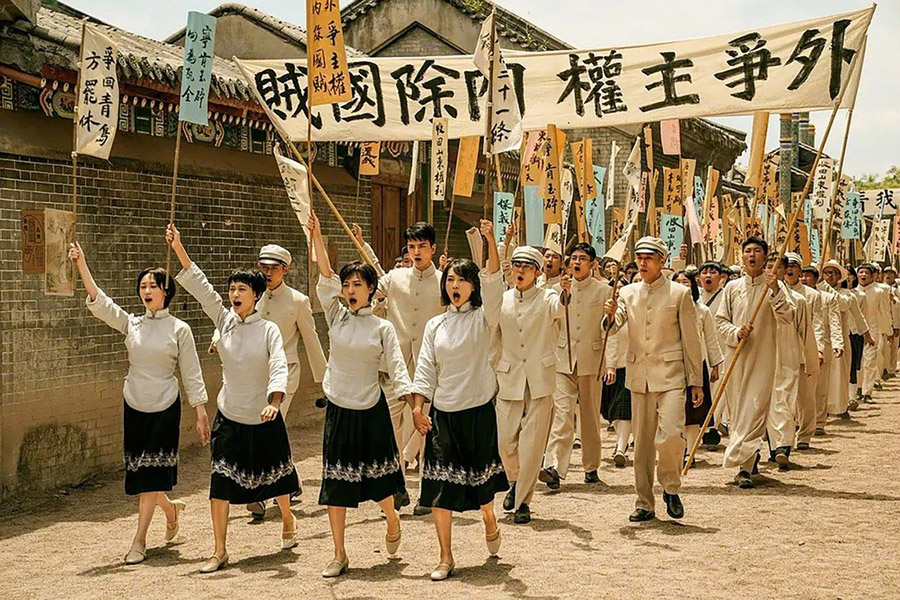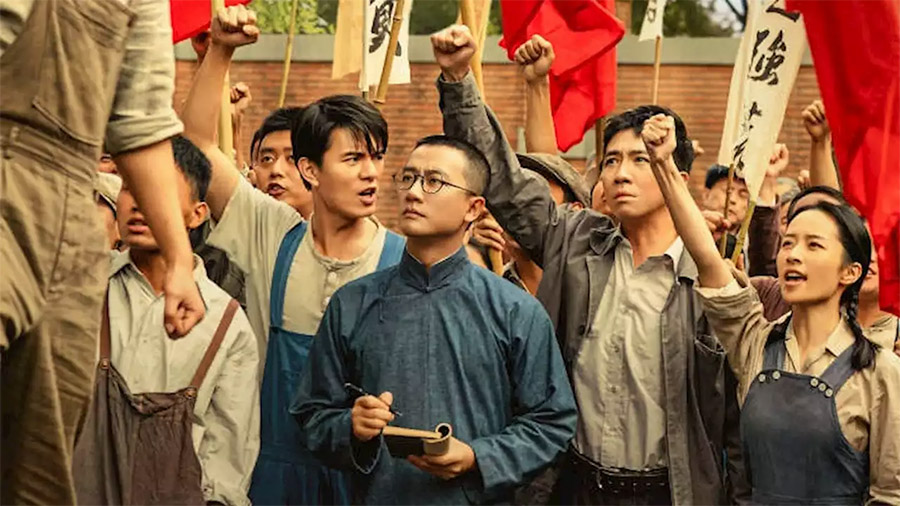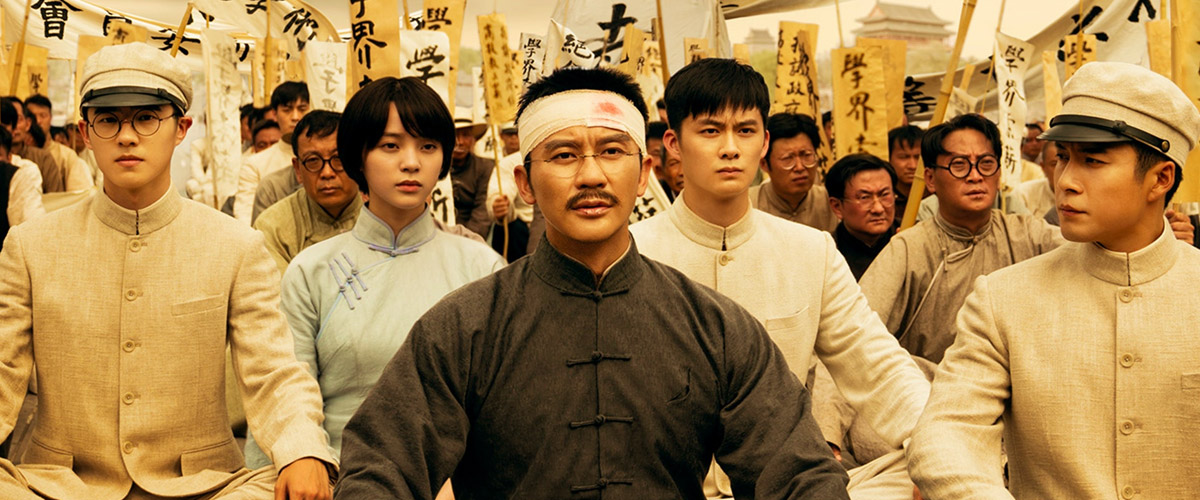To fully appreciate the historical significance of this youthful, zestful biopic about the founding of the Communist Party of China (CCP) circa 100 years ago, you need to either be a proud Chinese national, avid historian or a Mao Zedong fan.
Or ideally, all three.
Otherwise, you’ll be thoroughly confused by who’s who and what’s what in this new retelling. This character-populated film, aka The Young People’s Guide To Chinese Communism, has many young mainland stars and celebrities popping up in cameos playing party pioneers filled with idealistic, fresh-faced passion, and waits for no one unschooled in Chinese politics to catch up.

It’s a convolution that’s made more challenging by the tumultuous times this story swirls in, as it criss-crosses scattered locales from Shanghai to Beijing to Vienna to a quiet, history-making lake in Jiaxing. Their common thread – groups of dispersed Chinese patriots planning a Marxist new dawn for their foreigner-controlled country.
Here’s the big man, Mao, in this quick-sweep drama despite its lengthy 138 minutes that’s part spy thriller and part clandestine meeting organiser. Eager young Mao (Wang Renjun), the future ruler of modern China, is not yet looking the part destiny has in store for him, while he’s washing clothes as a humble laundryman. He’s keen, green and ready for momentous change as one among many budding revolutionaries in a vast, oppressed land.
The Chairman is, of course, given ample screen time, including a glimpse into his harsh childhood and his closeness with his dutiful, loving wife. Most impactful and probably over-dramatised for propaganda effect is a scene where Mao runs down the city streets in abject humiliation as a powerless citizen in his own invaded homeland. He seethes with anger as the French celebrate Bastille Day with fireworks and gaiety inside the walls of their opulent compound, from which he has been unceremoniously kicked out of.
The French are the main despised alien enforcers here since much of the action takes place near the French Concession, a part of Shanghai ceded to France.
It’s a racial domination portrayed to instantly get motherland sentiments into an irate tizzy with the sharpest moments being the smallest, relatable ones. Sikh traffic wardens beat a rickshaw rider who takes a wrong turn. A Chinese hand stretched out for a handshake is deliberately ignored by an arrogant Caucasian.

This flick, produced to commemorate a chest-thumping 100th anniversary, focuses on the pivotal year of 1921. When communism, propelled by Marx and Lenin in the Soviet Union, was on the rise in the world and the young educated idealists of China – teachers, students, writers, book publishers, philosophers – were determined to impose its socialist doctrines to free their divided and grossly unequal country.
The common aim here is to formalise their disparate, far flung alliances and declare an official communist party of China, by meeting secretly in a “1st National Congress”. Which, unlike the grandiose event it has become in Beijing now, was, back then, simply 13 Chinese representatives gathered together to pick leaders and endorse a manifesto with two ang moh Comintern (Communist International) delegates as witnesses in a crowded little room in Shanghai.
The city is a hotbed of activism comprising fired-up 20-somethings with reforming zeal – every historical figure’s age is plastered onscreen alongside their name to show how youthful they are – along with crowds of riled-up workers protesting for fairer treatment from uncaring Western companies. Kinda like a East, instead of West, Side Story but with songs that proclaim international brotherhood.
It’s a hugely dangerous thing to do because the ruthless local authorities in cahoots with the foreigners – two shadowy Chinese secret police agents resembling Gestapo thugs – are hunting the Marxist conspirators down as they whisper in hushed tones and look at strangers with suspicion.
Fortunately, the two principal figures here – teacher Li Da (The Great Wall’s Huang Xuan) and his knockout wife, Wang Huiwu (Ni Ni from Shock Wave 2) – are nimble, quick-witted congress planners able to dodge and evade their enemies.
Which, in accordance with co-directors Huang Jianxin and Zheng Dasheng’s purpose to turn history into an enthusiastic spy thriller to appeal to their targeted younger generation, also involves an assassin sent from Japan, 007-style, to eliminate a Japanese communist.

There’s also a quite absurd vehicular chase scene employing gleaming vintage cars, which looks like it’s been shot using the same props right after a similar sequence featured in Cliff Walkers.
Still, the best scene in this film is the one showing the well-intentioned elites – learned men in long robes – engaged in intellectual debate in their lowly-lit covert meeting about what the communist model for China should ideally be. Do they align with the workers or peasants? Should they adopt a European parliamentary system or a Soviet-type dictatorship? Should the Communist Party simply stay clear of politics?
“The path China takes must be trodden by ourselves,” goes the consensus.
Alas, if you think you’re going to be challenged by a French New Wave existentialist mood, this philosophical argument whizzes by too quickly.
As does the parade of historical personalities played by beautiful and basically beautifully optimistic people – in spite of the overwhelming odds and adversity – whom we generally do not recognise over here. Except for the famous names – future leaders Zhou Enlai with his trademark bushy eyebrows, and Deng Xiaoping as a spunky 17-year-old lad distributing “Support China” flyers in Paris.
They are so glamourised in such an inspirational-postcard way that we could really believe, for instance, that, after a perilous escape, the beginning of modern China in 1921 was officially sealed on a boat in a lake where a beautiful woman sat guard onboard in a drizzle, while brave young men huddled inside to conclude their monumentally important meeting.
In that case, then, this youthful rendition of old history is truly one for the ages.
GEEK REVIEW SCORE
Summary
This film about the origin of Communist China is good to see if you want to know about how a quarter of mankind came to be. Just remember our socialist-distancing … oops sorry… social-distancing rules.
Overall
7/10-
Story - 7/10
7/10
-
Direction - 6/10
6/10
-
Characterisation - 8/10
8/10
-
Geek Satisfaction - 7/10
7/10













